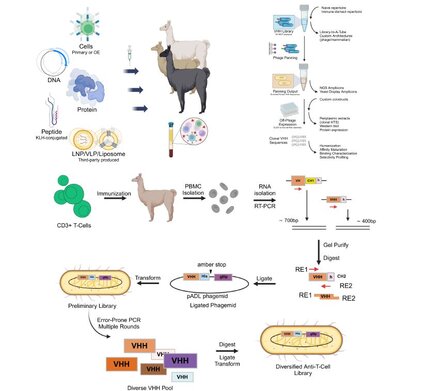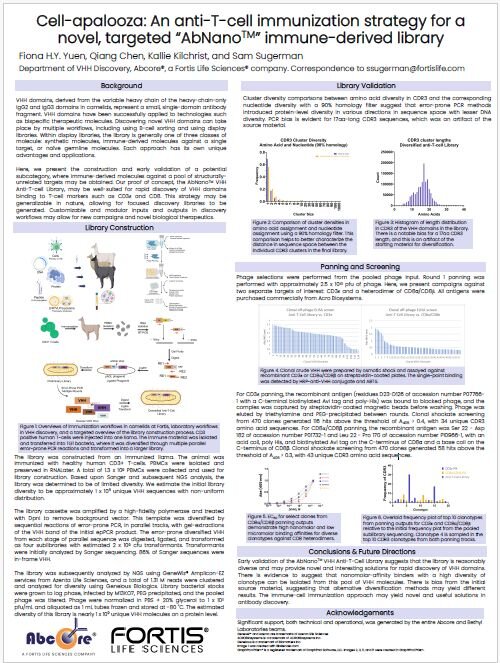AbNano™ Anti-T-Cell VHH Library
Introducing the AbNano™ Anti-T-cell VHH library, a first in-class immune-derived single domain antibody library designed specifically to overcome the complexities of t-cell surface protein targeting.
Leveraging advanced immunization strategies and error-prone PCR diversification, this unique platform contains nearly 1 billion unique VHH molecules to rapidly identify novel antibody candidates.

Anti-T-Cell Library Technical Overview
The AbNano™ library begins with immunizing llamas using
unstimulated human CD3+ T-cells, capturing a broad spectrum of native epitopes.
Initial sequencing revealed a diversity of approximately one million unique VHH
sequences, which were subsequently expanded through serial error-prone PCR,
achieving a final diversity nearing one billion unique protein-level VHH
sequences.
Key Benefits & Applications:
- High Diversity & High Affinity: With Nearly one billion diverse VHH molecules, AbNano™ enable rapid discovery of nanomolar-affinity binders.
- Unique Targeting Strategies: Immune-driven diversity ensures relevance and specificity in antibody identification.
- Versatile Platform: Ideal for bioprocess optimization, diagnostics, and early therapeutic discovery


What Separates Natural Libraries from Synthetic?
Unlike synthetic libraries, AbNano™ VHH libraries deliver immune-driven diversity for more relevant antibody discovery. This modular workflow is adaptable for future antibody campaigns in immunology and immuno-oncology.
See how this approach can accelerate your research: Download Poster >
Validated Targets & Affinity Data
- CD3ε: 34 unique clonotypes identified from 116 hits using ELISA screening.
- CD8α/CD8β: 43 unique clonotypes identified from 58 hits.
- Binding affinities range from high nanomolar to low micromolar, ensuring robust interaction profiles suitable for a wide range of research applications.

Streamline Your Discovery Timelines
Reduce late-stage attrition and streamline discovery
timelines by starting your antibody campaigns with our naturally derived, validated
VHH library. Whether you’re supporting a technical team or evaluating
innovative solutions at a strategic level, the AbNano™ platform is engineered
to deliver impactful results swiftly and reliably.
Choose the workflow that best suits your project’s requirements:
- Solid-Phase
Panning: Rapid, precise identification of VHH binders using
recombinant protein targets adsorbed onto styrene plates.
- Solution-Phase
Panning: Enhanced flexibility with biotinylated targets captured via
streptavidin beads, ideal for native-like binding conditions.